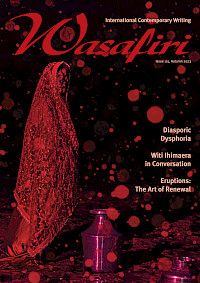Photography, Poetry, and Polyphony: Postmemory of The Gwangju Massacre in Han Kang’s Human Acts
Originally a poet, South Korean writer Han Kang has 'interwoven her textual practices encompassing poetry, essay, and novels.' Her book Human Acts (translated by Deborah Smith), a provocative testimony of the Gwangju massacre and simultaneously a lyrical rumination on how to narrate the event, is the outcome of Han's project on state violence from Gwangju to Buenos Aires. This study by Heewon Chung seeks to read Human Acts as a literary product of the postmemory generation, arguing that the novel's aesthetic characteristics of intermediality, intertextuality, and polyphony should be considered in order to grasp the various types of trauma transmission in the text. Read the full article online or in the print issue of the magazine.
Since winning the Man Booker Prize in 2016 with the English translation of The Vegetarian (2015), Korean author Han Kang has been internationally acclaimed as one of the most globally-recognised South Korean novelists. More than a few articles have focused on the explication of this novel in the anglophone literary world, and The Vegetarian seems to have earned its seat in the field of contemporary world literature (Kim 375–76). This debut was followed into English by Human Acts (2016) and Greek Lessons (2023). In the following pages I will argue that the literary world of and beyond the novels invites analysis in light of intermediality and intertextuality that crosses multiple genres and the boundaries of the (world) literature and (global) history. To this end, I read Human Acts, a provocative testimony of the 1980 Gwangju massacre and simultaneously a lyrical rumination on how to narrate the event, as a literary product of Han’s genre-crossing project on state violence on the local and translocal level.
Now officially labelled the Gwangju Democratisation Movement and commonly called the May 18 Uprising, the Gwangju massacre’s origin can be traced decades earlier to when Park Chung-hee grasped political power by a military coup d’état on 16 May 1961. The dictatorship had begun under the impetus of militarism and its absolute power enabled proclamation of the so-called ‘Purification of Political Activity Law’, which severely restricted political activity. When Park was assassinated, after his eighteen-year regime, his former protégé General Chun Doo-hwan muscled in during the political chaos. Led by Chun, the military dissolved the National Assembly and, on 17 May 1980, seized administrative power and declared full martial law. Meanwhile, as of 13 May 1980, the entire nation had been seething with protests against political oppression and later against the total martial law. In the afternoon of 18 May, students of Chonnam University in Gwangju, formerly defeated by special-forces troops that morning, regathered at Province Hall Square, only to be brutally beaten and scattered by the police (Lee 41–42). As the day went on, citizens of the city joined to support the student demonstrators, and the student protests evolved into the people’s uprising, lasting ten days. It ended with the massacre of hundreds of people by military force.
Since its publication, most reviews of Human Acts have naturally focused on its representations of trauma and have situated the novel within the so-called post-holocaust paradigm. Critic Cho Yeon-Jung notes ‘the voices of the painful souls of the dead’ and how the novel struggles with the impossibility of testimony to such an unspeakable event (137). Another critic Hwang Jung-A describes how the novel ‘questions the agency of testimony’ and ‘persistently denies historical sublimation’ of trauma (291). Jung Eui-jin and Cho Sunghee also consider Han’s contributions to the post-holocaust paradigm by comparing the novel with Holocaust literature by Primo Levy and Jean Améry. Despite paying the novel the critical attention it deserves, few critics focus on its crucial aesthetic characteristics of intermediality, intertextuality, and polyphony, which must be taken into consideration, I argue, if we are to grasp the full spectrum of trauma transmission in Human Acts. Recently, Daniel Y Kim has compared the novel to The Vegetarian in terms of translation and he shows how English-speaking readers are involved in the historical ‘local’ event that Human Acts depicts (392–93). In conversation with Kim’s way of reading Han’s novels as global literature, I address Human Acts as a literary product of the postmemory generation, and pay attention to its various aesthetic strategies of mediation and transmission.
Having started her literary career as a poet, Han has interwoven her textual practices in different texts, encompassing poetry, essay, and novels. In the following pages I will explore how Han articulates the traumatic event of the Gwangju massacre in diverse means of utterance, and how she achieves this goal through the novel’s aesthetic forms, and based on rich intertextuality. Reading her series of poems Winter Beyond the Mirror (2013) as indivisible complements to the novel, this study traces her translinguistic intertextuality constituted by photography, poetry, and the polyphonic novel, through the frameworks of post-traumatic spacetime and post-traumatic subjectivity. In order to do so, I will first elaborate on the theoretical discourse surrounding photography, poetry, polyphony, and postmemory that I’ll be using, discussed by such scholars as Roland Barthes, Shoshana Felman and Dori Laub, Mikhail Bakhtin, and Marianne Hirsch. For instance, Han’s poems narrate the ‘postmemory’ of the second generation, a term coined by Hirsch to designate ‘the relationship that the “generation after” bears to the personal, collective, and cultural trauma of those who came before’ (Generation 5). According to Hirsch, postmemory experienced as a belated encounter with the trauma of the past is constructed ‘by means of the stories, images, and behaviours among which they grew up’ (5). Thus, this paper will dwell on the various media of intergenerational transmission of trauma including photographs, videos, hearsay, and fragments of overheard dialogue. I will conclude by discussing the author’s aesthetic strategy of polyphony in terms of imagining textual communality among the multiple voices of Gwangju, and further consider the implications of the original title, The Boy is Coming …
Continue reading the full piece online or in Wasafiri 115.


